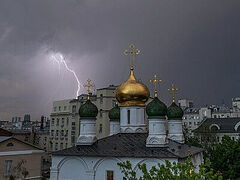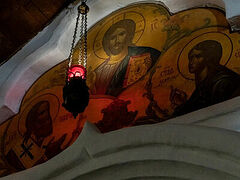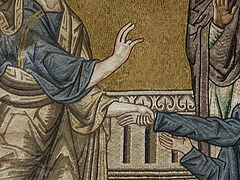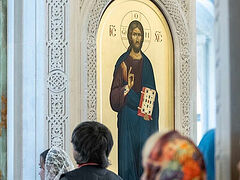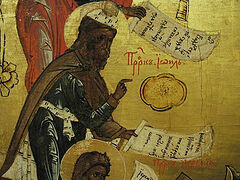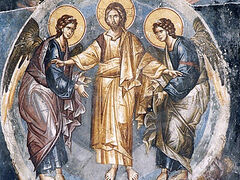We continue our talks on the Book of Acts with Sergei Komarov, a well-known catechist based in Moscow.
We continue to study the Book of Acts, with the fourth chapter.
4:32 And the multitude of them that believed were of one heart and of one soul: neither said any of them that ought of the things which he possessed was his own; but they had all things common.
We’ve already seen this, if you remember, in the second chapter. This is a word-for-word repetition.
4:33 And with great power gave the Apostles witness of the Resurrection of the Lord Jesus: and great grace was upon them all.
4:34 Neither was there any among them that lacked: for as many as were possessors of lands or houses sold them, and brought the prices of the things that were sold,
4:35 And laid them down at the Apostles’ feet: and distribution was made unto every man according as he had need.
This doesn’t mean people sold everything they had. It doesn’t say that. If we read it carefully, we see that everyone who owned land or houses sold them and donated the funds. It wasn’t something so sectarian as sometimes happens in our day. This early Christian communalism didn’t last long. If we remember the epistles of the Apostle Paul, he gathers alms for the faithful in Jerusalem. It means they needed them. So, obviously it was some kind of burst of early Christian self-sacrifice. But then it faded somehow. This isn’t the essence of Christianity, and people quickly realized it. The Jerusalem community ceased to exist in the 70s, and after the destruction of the Jewish Temple, this model also fell into oblivion, so to speak, forever.
4:36 And Joses, who by the Apostles was surnamed Barnabas, (which is, being interpreted, The son of consolation,) a Levite, and of the country of Cyprus…
(By the way, Barnabas is translated as “son of the prophets.” It’s not clear why it says “son of consolation.” That he’s a Levite is another mystery. The Levites had no land of their own, but it then says that he had his own land. But obviously this wasn’t so strictly observed by this point).
4:37 Having land, sold it, and brought the money, and laid it at the Apostles’ feet.
This Barnabas presumably studied with the Apostle Paul under Gamaliel, and the Evangelist Mark was either his nephew or cousin. That’s what we know about him.
Let’s start the fifth chapter, about Ananias and Sapphira—a very interesting story. It tells about the Christian Church’s first tragedy, the first abuse of funds, the first deception. Some problems are already entering the radiant atmosphere of the life of the first Church; spots are appearing on the sun. And you don’t have to be surprised by this—that’s life. A man in the Church doesn’t suddenly cease to be passionate and sinful. He’s given the potential to overcome it; he’s given the seed for battle; he’s given the grace of God.
5:1 But a certain man named Ananias, with Sapphira his wife, sold a possession,
5:2 And kept back part of the price, his wife also being privy to it, and brought a certain part, and laid it at the Apostles’ feet.
It’s amazing what the motive was. Perhaps they decided to sell, to give everything away, and then either she or he decided to keep it all for a rainy day instead. There are such moments of personal doubt. But when they deceived the Apostles, that was, of course, a most serious sin.
5:3 But Peter said, Ananias, why hath Satan filled thine heart…
See how St. Peter argues that Satan placed this thought in his heart.
Why hath Satan filled thine heart to lie to the Holy Spirit, and to keep back part of the price of the land?
5:4 Whiles it remained, was it not thine own? and after it was sold, was it not in thine own power? why hast thou conceived this thing in thine heart? thou hast not lied unto men, but unto God.
By the way, this is proof here of the Divinity of the Holy Spirit. First it says he lied to the Holy Spirit, and then it says he lied to God.
5:5 And Ananias hearing these words fell down, and gave up the ghost.
Question: Who killed Ananias?
There’s a surprising article by a famous publicist in the journal “Foma.” I was just reading it and I was shocked. What was the essence of the article? To show that God is too good to do such a thing. It’s a ridiculous attempt at theodicy (justification of God), when a man tries to be better than God and comes up with something like this. He reasons something like this: “Could God, Who is Love, kill a man? I couldn’t.” But then there’s the problem of how to interpret this text. And he says in his article: “It’s no accident that Satan is mentioned here. God basically stepped aside and just walked away from him, and Satan killed him.” Actually, that’s the problem. If it’s God Who gives life, can He really not take it away? He is the Lord of life. Yes, that’s exactly right. He takes it away at some point, and He takes it according to the providence known only to Him. And we don’t know who this fate will fall to when, and what edification others should receive from this death. Everything is interconnected here.
We truly don’t know God’s providence. Therefore, attempts to somehow explain it in a human way are ridiculous. Divine love is different. It’s not our disguised egotism or romantic walks. It’s different. Divine love can be stern. A surgeon cuts the patient. He does it out of love, to heal the person. From the outside, you might think: “What’s he doing? He’s cutting that guy.” It’s the same with God. He manifests His love according to His wisdom, His omniscience. This manifestation might not always fit into the framework of how we understand love.
Are the God of the Old Testament and the God of the New Testament the same God? God didn’t incinerate only Sodom and Gomorrah. If He followed this method now, He’d have to burn our entire civilization. Sodom and Gomorrah aren’t somewhere over there—they’re here, and here, within every one of us.
In the Old Testament, we see God massively, totally defeat so many people. What’s that about? Has God been reformed? He was bad and became good? Yes, they say, it’s Divine pedagogy. People were wild then—they could only be dealt with in a Stalinistic way. And now people have changed? I don’t know. It seems to me that we’ve become worse in some places. But God is unchanging. God is one and the same forever.
And of course the New Testament is a testament of love. It differs from the Old Testament in that the Son of God came and poured out His Blood for us, but God is the same. And the logic of His love continues to be inexplicable. Even the simplest things for God are probably incomprehensible to us. For instance, how are mercy and justice united in God? How? It’s impossible in the human world: either mercy or justice. As an elder once told me: “If God is just, then I’m lost.” We could all say this. He’s merciful, but He has Divine justice, and it’s different. Therefore, the phenomenon of God’s love is known by experience. And, by the way, many people, great saints who definitely knew what God’s love is, were tough, even harsh people. For instance, St. Joseph of Volokolamsk generally advocated for the execution of heretics. And these people also knew Divine love. Therefore, when God acts in this way, He has the right to do so, and He has His logic.
This is the interpretation of St. Theophylact of Bulgaria on this verse: “Many of the impious, making a show of what happened with Ananias and Sapphira, condemn the preeminent Apostle to death,” that is, they accuse St. Peter of having killed a man, “but the accusation concerns not St. Peter, but rather the Holy Spirit, Who pronounced a just sentence upon them, because St. Peter only exposed their lie; and they were both deprived of life as having sinned equally, by the Holy Spirit, Who has power over life and death. The same must be said about Sapphira, because it wasn’t St. Peter that killed her. But since the transgression was the work of both of them, the Judge punished both equally. That’s why St. Peter, as he knew about it and always spoke by the Holy Spirit, spoke what he was given by that same Holy Spirit.” He’s a mediator; he simply obeyed God—what the Holy Spirit told him.
As another commenter writes, “God takes the life of the couple for sins especially hated by God: avarice and hypocrisy, since this is the first mention of these sins in general.” And so, as an edification for the centuries, the millennia, God does something so terrible in our view. But we don’t know what would have happened to Ananias and Sapphira next, what would have been better for them. You’ve probably heard that God doesn’t punish anyone. But when you point to places in the Bible where it says that “God punished,” “He scourges every son whom He loves,” “Don’t shy away from the punishment of God,” and so on, they say: “This is punishment in the sense of teaching,” that is, He punished in order to teach. The Slavic word for punishment, “наказание (nakazanie),” doesn’t mean teaching. My friends, how many cases are there in the Bible when God punishes with a fatal outcome? This is no longer teaching. This is God taking life. For example, we’ll read later in the Book of Acts: And immediately the angel of the Lord smote him, because he gave not God the glory: and he was eaten of worms, and gave up the ghost (12:23).
God has punished the reprobate, and that’s in both the New Testament and the Old. Moreover, if we carefully read the Old Testament, we’ll find many New Testament intonations there, and if we carefully read the New Testament, we’ll find many Old Testament intonations. Here are some quotes from the Old Testament: The Lord God, merciful and gracious, longsuffering, and abundant in goodness and truth (Ex. 34:6). These are New Testament words, but it’s the Old Testament. Or: Can a woman forget her sucking child, that she should not have compassion on the son of her womb? yea, they may forget, yet will I not forget thee (Is. 49:15). The New Testament in all its glory: I have no pleasure in the death of the wicked; but that the wicked turn from his way and live (Ezek. 33:11), and so on.
Christ reveals His destructive power on the barren fig tree. He shows that He can not only show mercy, not only heal, but also punish. But He’s God. He can do this. He is Lord. He has the chessboard of the life of the world in front of Him, and He can freely move pawns and knock them down; but it’s simply wild for us to hear that, because we’re imbued with this European humanistic consciousness that has little in common with Biblical love. Biblical love is different. And the image of God in the Bible is different. The realities of that life are incomprehensible to us today, as the realities of our life would be incomprehensible to them. Here are a pair of New Testament places: For if we sin wilfully after that we have received the knowledge of the truth, there remaineth no more sacrifice for sins, But a certain fearful looking for of judgment and fiery indignation, which shall devour the adversaries (Heb. 10:26-27). The Apostle Paul also writes about communing unworthily. Remember, For this cause many are weak and sickly among you, and many sleep (1 Cor. 11:30). And in the Epistle to the Romans: For the wrath of God is revealed from Heaven against all ungodliness and unrighteousness of men, who hold the truth in unrighteousness (Rom. 1:18). In another place: Our God is a consuming fire (Heb. 12:29).
This is the New Testament. That is, these two Testaments are so intertwined that if you read them carefully you can see the image of the same God Who loves, Who has mercy and compassion, but Who can chastise and punish. And it’s His prerogative, His right. And it’s not out of passion that God punishes. It’s not some kind of revenge according to our understanding. This is God’s work with the sinful world. And this work is called love. It’s just that we’ll never understand how it happens. Otherwise, we’d have to explain the death of innocent children, violence against the innocent, and generally every teardrop, and drop of sweat or blood shed in our world. But we’ll never understand it. Never. But that doesn’t mean God’s gone on vacation. God is love, and He’s with us.
I’m not saying this because I’d like to get pleasure from someone’s torment. I myself am waiting for mercy from God. I know I’m a sinner; probably all of us ask God for mercy. But we have to read the Bible honestly and not process the image of God given to us in the Bible however we want, because our modern civilization wants to see God as some kind of nice grandfather who forgives everything, agrees with everything, and is tolerant with everyone. The Biblical image of love is different. This love is tough, it’s honest, lively, fervent, sincere—such is the zealous love of God.
Let’s turn to the commentary of St. Caesarius of Arles about Ananias and Saphhira. He writes in the sixth century, obviously anticipating these modern distortions of the word of God: “Lest we hastily assume that the punishment of sinners by God-inspired people occurred only in the New Testament, let us listen to the most blessed and most meek Apostle Peter, and we’ll see how the Holy Spirit works through him concerning Ananias and Sapphira. Be that as it may, this was done not for the blessed Apostle to avenge himself. For he suffered no insult from them, but through the mouth of St. Peter, the Holy Spirit uprooted the bad example of infidelity that had begun to spring up. Yes, that is, He pulled up this sprout for our edification.”
God understood that this would happen. But such edification was given to the community. And what I’m talking about now, in my opinion, more and more takes on the characteristics of some new heresy. That’s how this theory of non-punishment, where the sinner punishes himself, develops. And some strange conclusions are drawn from here. The expulsion of Adam and Eve from Paradise—it’s not God that expelled them. They themselves left, because they made themselves unsuitable for life in Paradise. But wait, we can open the Bible and read how God drove Adam and Eve out of Paradise (Gen. 3:23). How can this be? But it’s the word of God.
There will be self-condemnation of the sinner at the Last Judgment, but where is God in this model? It’s a kind of deism. There was this religious-philosophical teaching that when God created the world, He put His laws into the life of this world, stepped aside, and now He simply observes. And here sinners condemn themselves; Ananias and Sapphira kill themselves, Herods kill themselves, Adam and Eve drive themselves out of Paradise, man condemns himself, and God sits and watches. But honestly, I don’t get this. I don’t think it’s right. There is a living response from the living God to the events of our lives, to our thoughts, words, and deeds. It’s a kind of contact of the personal God with us as persons. Of course, God is a supernatural Person. It’s we who don’t understand God as a Person. Additionally, He’s unchanging; He can’t change, He can’t be nervous: “Oh, what did you do? I’ll show you.” It’s different, but there’s a natural reaction of holiness to iniquity. God responds to our actions; He responds for our good, and we’ll never understand the logic of these reactions. We see that, as Scripture says, He becomes angry, He hates. These are anthropomorphisms. Of course, it’s a human dimension applied to God, just to explain something to us. But God does react. He hasn’t remained outside the world. He participates in the life of the world. He’s an active participant.
5:5 And Ananias hearing these words fell down, and gave up the ghost: and great fear came on all them that heard these things.
5:6 And the young men arose, wound him up, and carried him out, and buried him.
They were buried in Palestine. Since the climate’s so hot there, they tried to bury the person on the same day.
5:7 And it was about the space of three hours after, when his wife, not knowing what was done, came in.
5:8 And Peter answered unto her, Tell me whether ye sold the land for so much? And she said, Yea, for so much.
5:9 Then Peter said unto her, How is it that ye have agreed together to tempt the Spirit of the Lord? behold, the feet of them which have buried thy husband are at the door, and shall carry thee out.
5:10 Then fell she down straightway at his feet, and yielded up the ghost: and the young men came in, and found her dead, and, carrying her forth, buried her by her husband.
5:11 And great fear came upon all the Church, and upon as many as heard these things.
The fear of God—pious fear. The Apostle Luke gives two examples: one good one, as Barnabas sold his land and laid the money at the Apostles’ feet; and the second, unfortunate example, with Ananias and Sapphira. So we mustn’t play with God. He can give life, and He can take it away. He’s God. Sometimes we lose our sense of this. In preaching about God as love, we sometimes lose these pious Old Testament notes of the fear of God that are so useful for us. We lose it because we become insolent. But God is great, terrible, transcendent, and incomprehensible. He is the Creator of Heaven and earth, the King of the world. It’s useless to try to understand His logic, as Isaiah says: My thoughts are not your thoughts (Is. 55:8). Our thoughts are not His thoughts, and His thoughts are not our thoughts.
And it’s stupid and useless to try to fit God’s love into the concept of our love. It’s different. We have to commune with this love, understand its logic, and be in it. And even more so, I think of course that it’s a sin to distort the Church’s understanding of Sacred Scripture with our own freewheeling interpretations. It’s not good. If the Holy Fathers have left us some kind of model of understanding, we have to at least give voice to it. For example, if we don’t agree, we can say: “This is what the Holy Fathers say. I don’t agree, and I’ll tell you why.”
It’s good when there’s commentary, constructive criticism.
To be continued…







